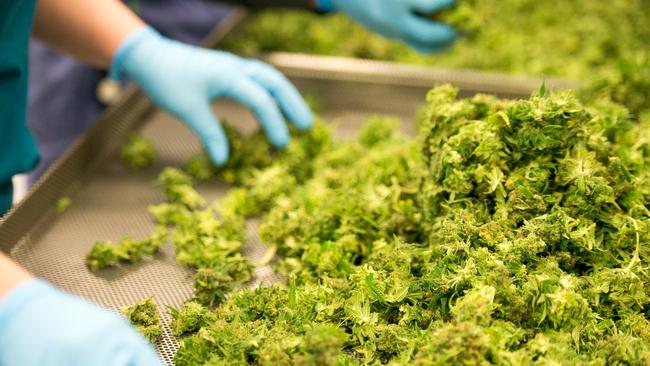Research discovers how long cannabis users are impaired
Scientists at the Lambert Initiative for Cannabinoid Therapeutics researched cannabis impairment and driving.

Gladstone
Don't miss out on the headlines from Gladstone. Followed categories will be added to My News.
How long cannabis users stay impaired or 'stoned' has been discovered by researchers at the Lambert Initiative for Cannabinoid Therapeutics, as medicinal cannabis prescriptions exceed 100,000 nationwide.
As legal cannabis is prescribed more regularly, lead researcher Dr Danielle McCarthy and associates conducted the most comprehensive study so far into cannabis impairment.
While the intoxicating ingredient in marijuana, THC, can be detected for weeks after consumption, researchers found people remained impaired for between three and 10 hours after consuming moderate to high doses of cannabis.
The Lambert Initiative for Cannabinoid Therapeutics was launched at Sydney University after Barry and Joy Lambert made a $33.7 million donation for research into the therapeutic use of medicinal cannabis.

Published in the Neuroscience & Behavioural Reviews journal, the research analysed 80 scientific studies on how THC affects driving performance conducted over the past 20 years.
"Most driving-related cognitive skills would recover within five hours and almost all within seven hours of inhaling 20 mg THC," the research found.
"These results suggest individuals should wait at least five hours following inhaled cannabis use before performing safety-sensitive tasks."
Impairment may last up to 10 hours, Dr McCarthy said, if high doses of THC were consumed orally.
When lower doses of THC were consumed via smoking or vaporisation, Dr McCarthy said the study found four hours was a more typical duration of impairment.
Researchers found the effects of THC on regular cannabis users were less than people who occasionally consumed cannabis.
The Therapeutic Goods Administration states more than 100,000 unapproved cannabis products had been prescribed through its special access scheme up to March 31, 2021.
Previous research by the Lambert Initiative released in December 2020 found cannabidiol CBD, the therapeutic ingredient in medicinal cannabis, did not impair driving.
Participants were given four different types of cannabis and their driving was assessed on a 100km/h highway, in a dual control car with a driving instructor.
"These findings indicate for the first time that CBD, when given without THC, does not affect a subject's ability to drive," lead author Dr Thomas Arkell said.
"That's great news for those using or considering treatment using CBD-based products.
"These results should allow for evidence-based laws and regulation for people receiving medical cannabis."

Lambert Initiative Academic Director, Professor Iain McGregor said studying the effects of cannabis on driving with such precision in a real-world context was incredibly important.
"With rapidly changing attitudes towards medical and non-medical use of cannabis, driving under the influence of cannabis is emerging as an important and somewhat controversial public health issue," Prof McGregor said.
"This is the first study to illustrate the lack of CBD effects on driving and to also provide a clear indication of the duration of THC impairment.
"The results should reassure people using CBD-only products that they are most likely safe to drive, while helping patients using THC-dominant products to understand the duration of impairment."
Other stories
Devastating smash and grab at popular Gladstone business
Review requested over footage of alleged polling incident
Duke of Edinburgh Award will continue to honour Prince Philip


